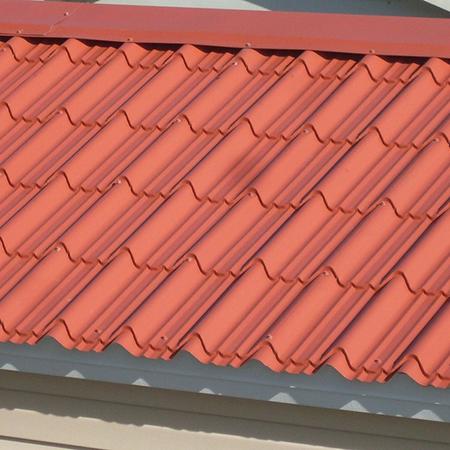When considering a metal roof for your home, a common concern is, “Are metal roofs loud when it rains?” This question often deters potential buyers who envision a deafening cacophony with every downpour. However, the reality is much more nuanced. In this article, we will explore the noise levels associated with metal roofs, factors influencing these levels, and ways to mitigate any potential noise. By the end, you’ll have a comprehensive understanding of whether a metal roof is the right choice for you.

The Perception of Noise: Are Metal Roofs Loud When It Rains?
1. Common Misconceptions
The belief that metal roofs are excessively noisy stems from outdated information and experiences with older metal roof installations, such as those on barns or industrial buildings without proper insulation or soundproofing. Modern residential metal roofs are significantly different and much quieter.
Read too: Decoding Timelines: How Long Does It Take To Replace A Roof and What to Expect
2. Types of Metal Roofs and Noise Levels
The type of metal roof and the installation method can greatly influence the amount of noise during rain. Metal roofs typically come in two styles:
- Standing Seam Metal Roofs: These roofs feature long, vertical panels with seams that interlock, creating a sleek appearance. They tend to be quieter due to their construction and the way they are fastened to the roof deck.
- Metal Shingles: These mimic the look of traditional roofing materials like shingles or tiles. They are often installed over a solid underlayment, which helps dampen noise.
Factors Influencing Noise Levels on Metal Roofs
1. Roof Decking
A solid roof deck is crucial in minimizing noise. Plywood or oriented strand board (OSB) is often used to create a continuous surface for the metal panels to attach to, significantly reducing the sound of rain hitting the roof.
2. Insulation and Underlayment
Proper insulation and underlayment are key components in noise reduction. Here’s how they help:
- Insulation: Adding insulation in the attic or ceiling area helps absorb sound. Spray foam insulation is particularly effective in creating a sound barrier.
- Underlayment: Using a high-quality, sound-deadening underlayment between the metal roof and the roof deck can greatly reduce noise. Rubberized or synthetic underlayments are particularly effective.
3. Fastening Methods
The method used to fasten the metal panels also impacts noise levels. Screws with neoprene washers are commonly used to secure the panels, which helps in reducing vibrations and noise.
Are Metal Roofs Loud When It Rains? Addressing the Concerns
1. Modern Metal Roof Technology
Advancements in roofing technology have made modern metal roofs much quieter. Techniques and materials that were not available in the past are now standard in reducing noise.
- Noise-Reducing Coatings: Some metal roofs come with coatings designed to dampen sound.
- Structural Enhancements: Advanced designs and better fastening methods contribute to a quieter metal roof.
2. Comparison with Other Roofing Materials
It’s important to compare metal roofs with other common roofing materials:
- Asphalt Shingles: Asphalt shingles are quieter during rain but do not last as long as metal roofs and are less durable in extreme weather.
- Tile Roofs: Tile roofs can be quieter than metal roofs but are heavier and more expensive to install.
- Wood Shingles: Wood shingles provide good noise insulation but require more maintenance and have a shorter lifespan compared to metal roofs.
How to Mitigate Noise with Metal Roofs
If noise is a concern, there are several strategies to minimize it:
1. Increase Insulation
Adding more insulation in the attic or ceiling can significantly reduce the noise from rain. Consider using high-density insulation materials for better sound absorption.
2. Use High-Quality Underlayment
Invest in a premium underlayment designed for soundproofing. This layer is crucial in creating a barrier that dampens noise.
3. Install Acoustic Panels
Acoustic panels can be installed on the interior side of the roof or ceiling to absorb sound. These panels are effective in reducing noise levels in living spaces.
4. Choose Thicker Metal Panels
Thicker metal panels tend to be quieter because they are less prone to vibrating with the impact of raindrops.
Benefits of Metal Roofs Beyond Noise Concerns
While noise reduction is an important consideration, metal roofs offer several other benefits that make them a worthwhile investment:
1. Longevity
Metal roofs can last 40-70 years, far outlasting traditional asphalt shingles. This longevity makes them a cost-effective choice over the long term.
2. Durability
Metal roofs are highly resistant to severe weather conditions, including high winds, hail, and heavy rain. They are also non-combustible, providing excellent fire resistance.
3. Energy Efficiency
Metal roofs reflect solar radiant heat, reducing cooling costs by up to 25%. This makes them an energy-efficient option, particularly in hot climates.
4. Environmental Impact
Most metal roofing materials are made from recycled content and are fully recyclable at the end of their life. This makes metal roofs an environmentally friendly choice.
Real-Life Experiences: Are Metal Roofs Loud When It Rains?
Many homeowners who have switched to metal roofs report minimal noise issues. The combination of modern materials, proper installation techniques, and effective soundproofing measures ensures that the noise level is comparable to, or even quieter than, other roofing materials.
Conclusion: Debunking the Myth
“Are metal roofs loud when it rains?” The short answer is no, not when installed correctly with the appropriate materials. Modern metal roofs, with their advanced technology and proper installation, are not significantly louder than other types of roofs. By addressing concerns about noise with high-quality insulation, underlayment, and installation methods, you can enjoy the numerous benefits of a metal roof without worrying about excessive noise during rain.



Leave a Reply